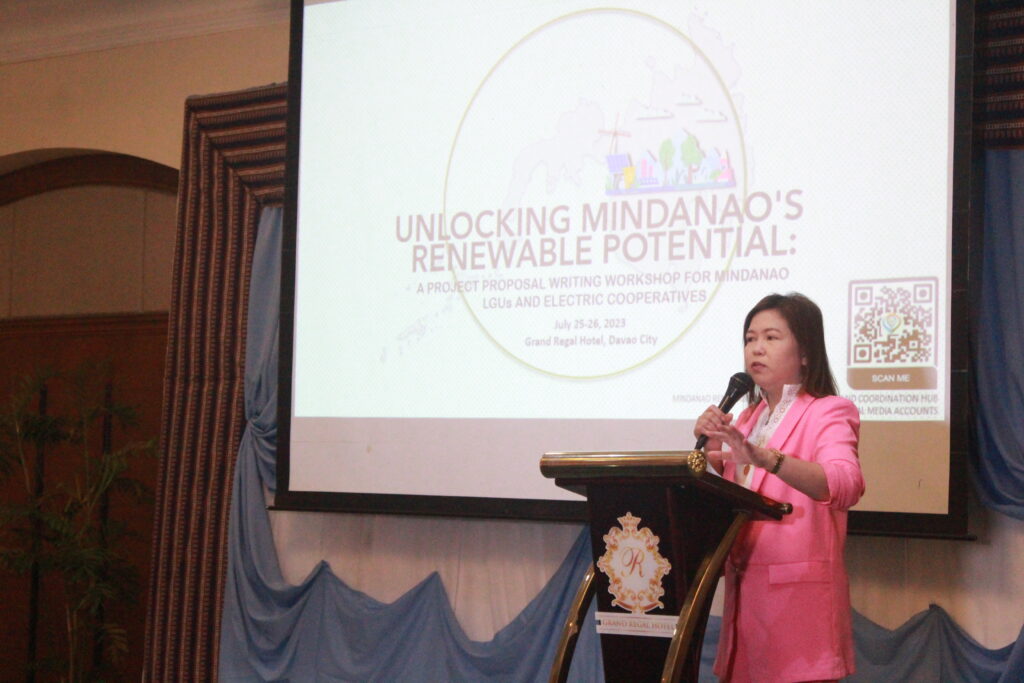
Mindanao LGUs, Electric Cooperatives Join Forces for Renewable Energy
Local government units (LGUs), electric cooperatives, and development partners across Mindanao gathered for a two-day workshop aimed at ramping up project proposal writing skills and accelerating the region’s shift toward affordable and clean energy. The event, titled “Unlocking Mindanao’s Renewable Potential: A Project Proposal Writing Workshop for Mindanao LGUs and Electric Cooperatives,” focused on integrating Sustainable Development Goals (SDGs)—particularly SDG 7 (Affordable and Clean Energy) and SDG 5 (Gender Equality)—into project planning.
MREC’s Mission for Total Energization
In his opening address, Dr. Nelson Enano Jr., Chair of the Mindanao Renewable Energy and R&D Center (MREC), underscored the urgency of electrifying all Mindanao communities—including remote and Indigenous Peoples’ areas—and aligned these efforts with the Microgrid Act of 2022.
“Everyone should have access to electricity. We must address the hardest-to-reach communities, whether in mountainous IP settlements or isolated islands,” Dr. Enano said.
He introduced MREC’s current research on Concentrated Solar Power (CSP) and Ocean Renewable Energy (ORE), pointing to these technologies as key drivers of Mindanao’s renewable energy future.
Advocating Gender Equality in Energy
Ms. Amelita “Melot” Balisalisa Atillo, an Independent Consultant from the Gender and Development Committee of RDC XI, highlighted pervasive gender gaps in the energy sector during her session on SDG 5 (Gender Equality).
“Gender issues—from lack of access to energy services, to underrepresentation in decision-making—hold back half of our workforce. We must address these disparities,” she noted.
Ms. Atillo pushed for gender mainstreaming in project design and implementation, calling on participants to collect sex-disaggregated data and create inclusive programs that involve women in leadership and technical roles.
Strengthening Project Proposals
On both days, Dr. Reynaldo C. Navacilla, Deputy Chief of Party-Operations for URC-CHS BARMM Health Project, led sessions on crafting effective project proposals and managing resources. He emphasized the Project Management Life Cycle (initiation, planning, execution, monitoring, and closure) and the Triple Constraint (scope, time, cost) as cornerstones of successful project outcomes.
“Clear objectives, robust research, and realistic budgeting are non-negotiable when seeking donor support,” Dr. Navacilla said, urging participants to align project proposals with their organizations’ strategic goals.
Logical Framework & Design Thinking
Participants also delved into the Goal-Oriented Project Planning (GOPP) approach—analyzing problem trees and objective trees to map out targeted solutions. Dr. Navacilla stressed that turning a problem tree into an objectives tree helps teams structure how they will address specific energy challenges.
During a dinner keynote, Mr. John Maynard Gan of USAID introduced Design Thinking, a human-centered methodology encouraging project teams to empathize with communities, define precise problems, brainstorm creative solutions, prototype, and test on-the-ground feasibility.
“Focus on designing solutions that are not just ‘usable’ but truly ‘useful’ to the community. Empathy and iteration make a big difference,” Gan advised.
Budget Preparation & Sustainability
Dr. Marietta L. Eliot-Pampanga, DBA, spoke on budgeting for renewable energy projects, emphasizing transparency in financial proposals and alignment with project goals:
“A clear, thorough budget—free of hidden costs—builds donor confidence and sets realistic expectations,” Dr. Eliot-Pampanga said.
Sustainability remained a recurring theme, with all speakers urging participants to plan for post-project continuity—particularly critical for new energy ventures in off-grid, marginalized communities.
Looking Ahead
The workshop wrapped up with a renewed commitment from LGUs, cooperatives, and partner agencies to champion inclusive, gender-responsive renewable energy projects across Mindanao. Participants left with sharpened project management skills, a clearer grasp of proposal writing essentials, and actionable strategies to tackle the region’s energy gaps.
“By merging innovative technology with inclusive policies, we can transform Mindanao into a hub for clean, affordable, and equitable energy,” Dr. Enano concluded, echoing the shared vision that resonated throughout the two-day event.